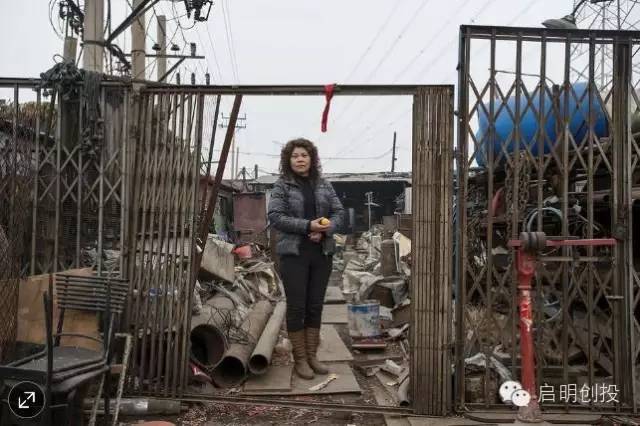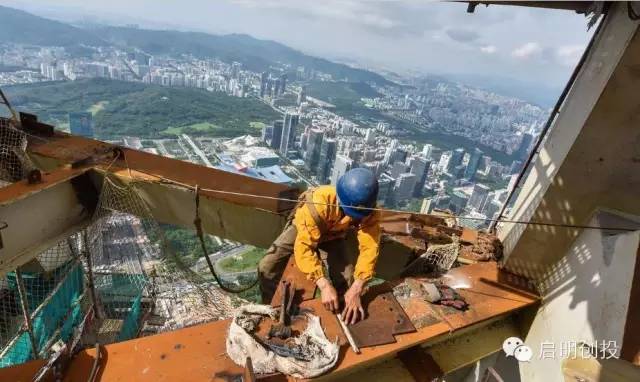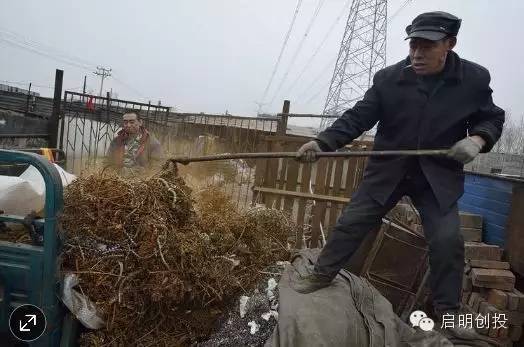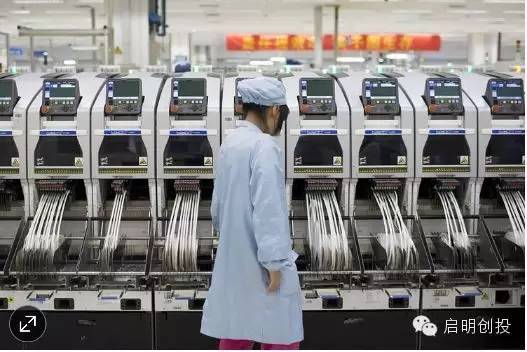
Scrap-metal merchant Liu Junxia in a yard in the recession-battered northeastern steel town of Fushun, China,
March 3. Photo: Mark Leong for The Wall Street Journal
Fushun, a city built on coal in China’s industrial northeast, is in full-blown recession. Liu Junfen, a scrap-metal merchant who gathers discarded bicycles, hubcaps and gas cylinders to feed to local steel furnaces, says that prices have plunged by two-thirds since China’s overbuilt real-estate market took a dive in 2014—if she can find buyers for her junk at all.
As for this year’s prospects—“Gou qiang,” she sighs, an expression that means something like “unbearable.”
Meanwhile, at the other end of China, the coastal city of Shenzhen clocked sizzling growth of 8.9% last year. Shenzhen is the home of Tencent, a social-media company whose QQ network boasts more than 800 million users, along with the telecommunications giant Huawei. Vincent Hu, the chief executive of Cloud Frame, a company that builds data centers, is assembling a monster-sized facility for Amazon, and he sees no end to expansion as consumers embrace e-commerce, online banking and video-sharing. “You only have to use your imagination,” he says.
To say that the world’s second-largest economy is decelerating—last year’s 6.9% growth was the slowest in a quarter century—is to miss this contrast in regional fortunes. The divergence is the most striking feature of today’s China, where despair and hope exist in equal measure. The question of how to manage this gulf, which threatens to bring social conflict, is likely to dominate the annual session of the National People’s Congress, the country’s parliament, which begins in Beijing this weekend.
Lawmakers and political advisers from all over China are gathering in Beijing in early March for what's known as the 'lianghui,' or 'Two Sessions.' WSJ’s Felicia Sonmez explains what happens at this annual political event.
China’s economic slow lane is choked with state-owned industrial firms in sectors linked to real estate—steel, cement, coal and construction equipment—all suffering from massive overcapacity. Many get by on bank loans, endlessly rolled over, and orders for boondoggle civil-works projects. They are zombies in a phantom economy. Lawmakers gathered at the Great Hall of the People are likely to review government plans to reduce industrial capacity somewhat and to gradually lay off several million workers while offering them help with relocation and retraining.
Zipping along in the economic fast lane are private companies producing goods and services for a burgeoning consumer market that has taken over from manufacturing as the engine of China’s growth. These corporate leaders are mainly clustered in megacities along China’s eastern seaboard—Shenzhen, Guangzhou, Shanghai, Beijing—linked to global networks of knowledge, finance and talent.
Lopsided growth in a nominally socialist country is an especially thorny problem. Deng Xiaoping resolved the issue by turning Marxism on its head: “Let some people get rich first,” he famously declared. But today’s Internet-empowered industrial workers won’t be treated as second-class citizens. Some hanker for a return to socialism. Others find solace in religions and cults that challenge Communist Party control. Widespread anger at wealth disparities could further sap the resolve of China’s leaders to press ahead with economic reforms—and might even encourage them to launch military adventures to deflect popular frustrations.
Fushun—in Liaoning province, part of a vast resource-rich wilderness formerly known as Manchuria—had its chance to catch up. For a decade, the city boomed as China embarked upon the greatest building spree in history. A voracious nationwide demand for steel offered dreams of riches, even to workers picking for scraps like Ms. Liu. She and her husband managed to save enough to buy an apartment and even one for their son.
Once a national laggard, Liaoning province saw its growth peak in 2007 at 15% and continued to outstrip the national average until 2014. Then the property market started to crumble. The region paid the price for the colossal overbuilding spurred by a credit stimulus that Beijing unleashed when export markets collapsed after the 2008 global financial crisis. Liaoning’s growth last year was just 3%. The city of Fushun is shrinking.

A worker braves scorching heat as he welds parts on top of the Ping An International Finance Center, Shenzhen,
China, July 2, 2015. Photo: Mao Siqian/Xinhua/Zuma Press
A sense of betrayal adds to the distress of a protracted recession. A wide avenue that connects Fushun to the nearby provincial capital of Shenyang suggests what might have been. Civil engineers installed an electrified light-rail system on the middle of the thoroughfare. Real-estate developers threw up luxury condominiums on either side. But the anticipated influx of buyers never materialized. These days, people are fleeing the area, not arriving. Gleaming trams, mostly empty, glide past ghostly developments with names like “Green Sunshine City” and “Thai Garden Bay.”
Much of the region’s growth came from building infrastructure, not from economic activity it generated. Trickle-down economics was an illusion. So was the theory that inland areas were set for a new golden era as high land and labor costs drove investment away from the coast. “Everyone said the baton of growth would pass to the interior,” says Andrew Batson, the China research director of Gavekal Dragonomics. “It totally has not happened.”
Ms. Liu has done the math behind Fushun’s property glut. “I own an apartment with my husband,” she says. “My parents own an apartment, and so do his parents. We’ve bought an apartment for our son. Three generations have homes to live in. Who’s buying?” In fact, their son has abandoned Fushun; he’s found a job in Beijing in a computer-games company.
Down a muddy track, a truck-repair outfit called the Prosperous Goose Heavy Transport Co. is idle. The owner, Jia Junxia, says that she has applied for a passport and is getting ready to leave China with her children. Snapping closed an expensive leather purse, she reveals her fanciful business plan: a guesthouse in America, somewhere in the sun. “The economy here won’t collapse,” she says, “but it won’t get much better either.”

Workers in a salvage yard in Fushun, China, March 3.
Photo: Mark Leong for the Wall Street Journal
For international investors, China’s two-speed economy—one dying, the other accelerating—is utterly confusing, and it has produced wildly contrasting strategies. If China keeps subsidizing wasteful investment to keep industrial cities alive, its financial system will eventually blow up: At 260% of gross domestic product, the country’s overall debt is approaching danger levels. Some Wall Street hedge funds are taking huge speculative bets against the Chinese currency. Global markets are bracing for a “hard landing” by the Chinese economy and years of subpar growth. The financier George Soros says China is already crashing.
At the same time, however, some of the world’s smartest investors are making the opposite wager: They are piling in. Last year, China attracted up to $37 billion in venture capital, much of it for technology hubs along the coast. That is more than the U.S. typically draws in a year and multiples of what Europe usually pulls in.
Gary Rieschel, the founder and managing director of Qiming Venture Partners, has just raised $648 million from a group of investors that includes Harvard, Princeton, Duke and the Massachusetts Institute of Technology. He ranks Chinese entrepreneurs as highly as any in Silicon Valley, and he says that China will lead the world in technologies like electric vehicles. “It’s hard to deal with the rate at which things change,” he says.
Who’s right? Politics will largely determine the outcome. And right now, things are finely balanced. Much hinges on the choices that the Chinese government makes in the northeast—historic Manchuria—which has played an outsize role in shaping modern China. In the 17th century, Manchu tribes swept south across the Great Wall to capture Beijing and set up the last imperial dynasty, the Qing. As the Qing declined, czarist Russia drove a railroad through the region to the Pacific. In the 1930s, Japanese militarists turned the area into a puppet kingdom and built car plants, aircraft factories and chemical works. Later, Mao Zedong made Manchuria the industrial heartland of his command economy.
President Xi Jinping is sometimes described as the most powerful Chinese leader since Mao, and his political vision harks back to that time; he is loath to dismantle the decaying socialist industries leading China’s economy toward disaster.
A good place to understand Mr. Xi’s mind-set is the memorial hall to Fushun’s most famous resident, Lei Feng, a Mao-era “model worker” lauded for carrying manure and washing the socks of his comrades. He died on duty, killed by a falling telegraph pole. The hall is a shrine to the values that Mr. Xi says will spur the “great rejuvenation of the Chinese nation”: patriotism, thrift, selflessness, obedience to the party. Mr. Xi has declared that “the spirit of Lei Feng is eternal,” and he is apparently determined that it will live on in state enterprises.
Two years ago, Mr. Xi announced an ambitious 60-point economic reform program to give markets a “decisive role” in allocating resources. Many expected that he would shutter state loss-makers and open protected state industries like telecommunications and banking to entrepreneurs, even as he attacked the patronage networks that weave through local industry and governments.
But Mr. Xi seems to have gotten cold feet. Instead of closing down state enterprises, he is bulking them up. He seems afraid that allowing market forces to prevail will entrench geographically based wealth disparities and that an aggrieved underclass could erode the Communist Party’s legitimacy. As Mr. Xi has made clear during his three years in office, his first priority is to save the party. The economy can wait. Against this political backdrop, Beijing’s usually decisive economic decision-making process has started to look rudderless.

An employee monitors machinery used in the production of smartphone circuit boards at ZTE Corp.’
s headquarters, Shenzhen, China, Aug. 7, 2014. Photo: Brent Lewin/Bloomberg News
The Communist devotion of a figure like Lei Feng doesn’t get much attention in the coastal city of Shenzhen, where the economy is now roughly the same size as Hong Kong’s—although it is streaking ahead far faster. Property prices jumped almost 50% last year as high-paid creative talent flooded in. The city is conjuring forth huge personal fortunes and inventive companies, even as industrial giants in the north wilt.
Frank Wang, a model-helicopter enthusiast, hit the jackpot three years ago when he launched a lightweight, inexpensive drone fitted with cameras. His firm, SZ DJI Technology Co., is valued at around $8 billion. ABC’s “Good Morning America” flew one of his drones into an Icelandic volcano last year and live-streamed the footage.
There is a strange irony in money escaping China to the U.S. and other havens when some of the world’s biggest commercial opportunities remain in China. Take the movie industry. Over the recent Lunar New Year holiday, Chinese cinemas took in more money than U.S. ones over Christmas and New Year—even as American revenues were bloated by the new “Star Wars” blockbuster, which didn’t do as well in China. Some U.S. movies now gross more in China than at home. China is “changing the paradigm of Hollywood,” says Jack Gao, the group vice president of Wanda Cultural Industry Group, part of the business empire of billionaire real-estate developer Wang Jianlin, who owns the AMC cinema chain.
But Beijing has delayed addressing its industrial problems for too long: Economic imbalances have grown monumental and could take the economy down. A recent report by the European Union Chamber of Commerce in China says that China’s steel capacity is more than double the world’s next four biggest producers combined—Japan, India, the U.S. and Russia—and has become “completely untethered from reality.” It is a similar story in the cement industry. From 2011 to 2012, China produced as much cement as the U.S. did during the entire 20th century, the report notes.
China is still urbanizing. Its capital stock per capita—factories, locomotives, bridges and so on—is only a fraction of America’s, which means that demand for basic industrial goods won’t dry up. But the country may have reached peak demand; coal production is already declining. Fushun’s coal mines are exhausted.
Mr. Xi dreams about using China’s vast industrial surpluses to construct new overland and maritime trade routes to Europe. The so-called “One Belt, One Road” project, though, is an improbable vision—a string of industrial parks, linked by road, rail and energy pipelines running through remote parts of Central Asia and the Middle East that are infested by terrorism and banditry.
Still, Mr. Hu, the chief executive of Cloud Frame, the Shenzhen data-center manufacturer, remains an optimist. If Western observers often fixate on China’s vulnerabilities, he and other Chinese entrepreneurs focus on its resilience. “In a crisis, Beijing has many more levers it can pull,” he says. For millennia, he notes, Chinese emperors planned for invasions from nomad tribes to the north, and he thinks their successors are no less prepared.
But history holds other lessons. The Manchu dynasty collapsed in large part because it clung to old ways of thinking that were incompatible with the industrial trends of the day. The Empress Dowager Cixi, who presided over the final decay, opposed railways on the grounds that clanking steam engines would disturb souls interred in tombs along the tracks.
If China fails, it will not be for lack of investment funds, talent or ambition; it will be largely because Mr. Xi failed to open up the heartland to harsh market forces and risk social turmoil. It will be because he decided to surrender his economy—and the rest of the world—to the icy winds that howl through Fushun this time of year. It will be a Manchurian winter.
Write to Andrew Browne at andrew.browne@wsj.com